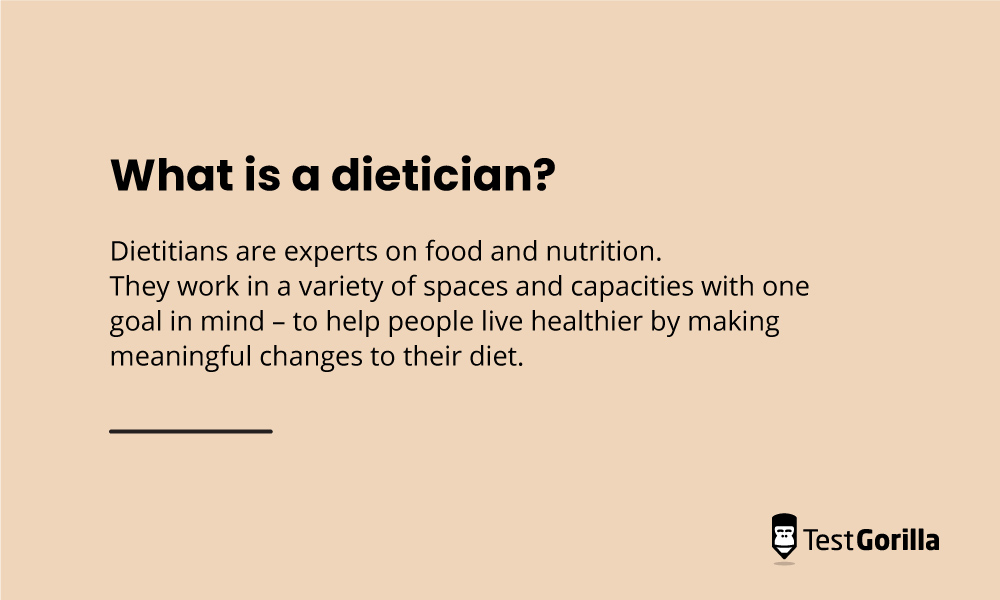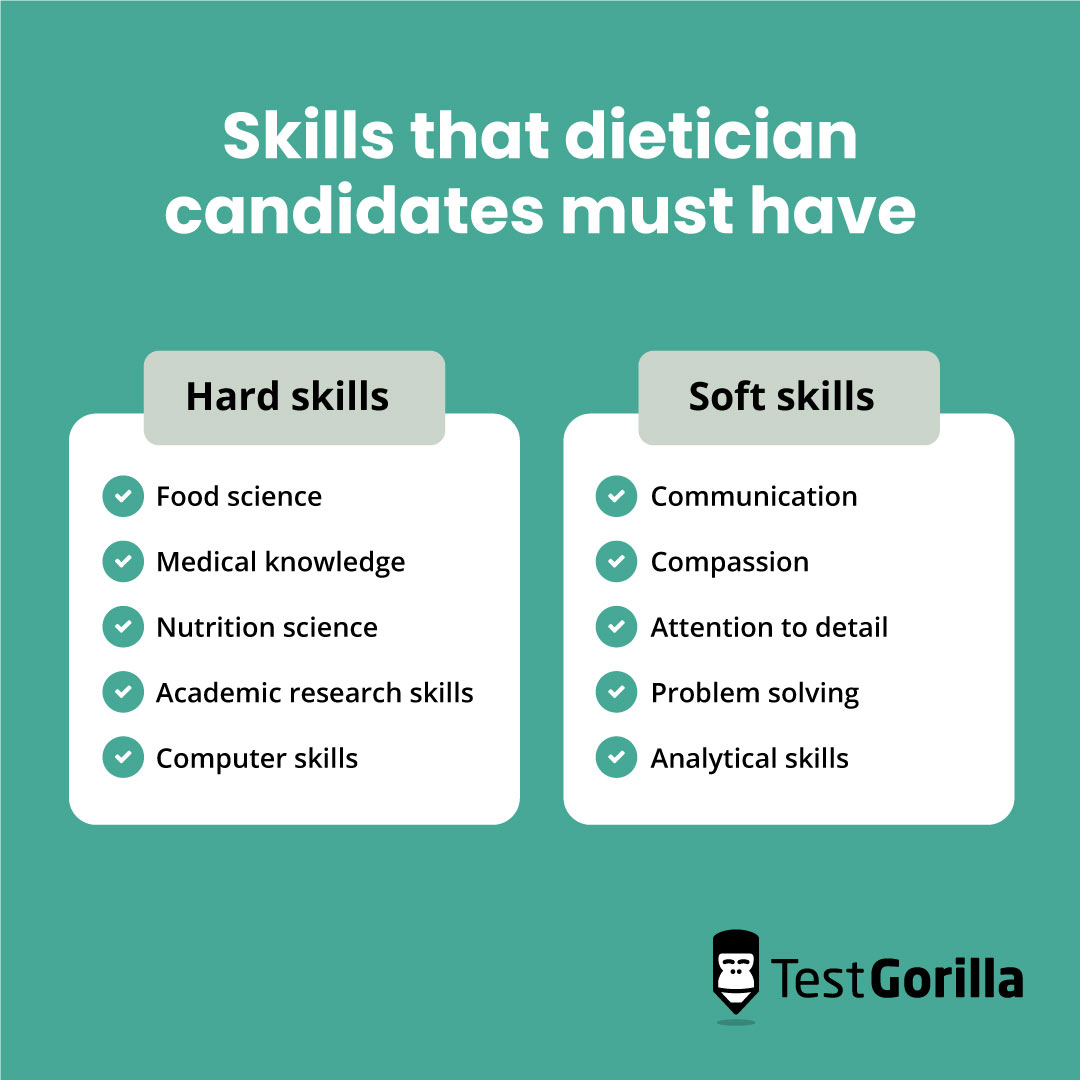What we eat is central to our health[1] and most people realize this. According to a survey done by L.E.K., 93% of people wish to eat healthier at least some of the time[2].
But how can you do this? What should you eat to be healthier?
What do you lack in your diet? What food or food group do you need to consume more of in order to feel better?
A dietitian can give you an informed answer to all those questions. Hiring a dietitian, be it for your organization or as an individual, is the best choice if you want to use a science-backed approach to diet management.
Since your dietitian will be in charge of navigating the connection between nutrition and health, you need to pick them carefully.
So, to make sure you’re choosing a qualified professional, we’ve put together a comprehensive guide on how to hire a dietitian.
Below, you will find information about what is a dietitian, what is the difference between a nutritionist and a dietitian, what are the essential skills for a dietitian, and how to assess your candidates through skills testing and interviews.
Table of contents
What is a dietitian?
Dietitians are experts on food and nutrition. They work in a variety of spaces and capacities with one goal in mind – to help people live healthier by making meaningful changes to their diet. Some of the organizations that usually hire dietitians include:
Clinics
Assisted living facilities
Nursing homes
Cafeterias
Gyms
Hospitals
Schools
Day-care centers
Their job may include helping people manage chronic conditions, building safe food elimination protocols for certain conditions, working through eating disorders with patients, and identifying dangerous nutrient deficiencies.
Many people think dietitians’ main focus is to help people lose weight but the range of their services is much wider. Some of the responsibilities of a dietitian are to:
Assess their patients’ health goals and dietary needs
Identify any nutrition-related health problems, such as malnutrition or micronutrient deficiencies
Develop personalized nutrition plans and help patients implement them
Monitor their patients’ progress
Maintain and update a database with patient information
Conduct medical nutrition therapy to help manage health conditions
What is the difference between a dietitian and a nutritionist?
People frequently use dietitian and nutritionist interchangeably. While the two job roles have some similarities – after all, as both focus on general nutrition and diet guidance – it’s important to know the differences.
Here are three of the major differences between a dietitian and a nutritionist:
Educational background: A registered dietitian (RD) or a registered dietitian nutritionist (RDN) has completed multiple levels of education and training, such as the ones established by the Accreditation Council for Education in Nutrition and Dietetics (ACEND) in the US. Dietitians must meet certain educational requirements to call themselves dietitians, while in most countries practicing as a nutritionist doesn’t require any specific qualifications.
Regulation: Dietitians are regulated by professional organizations and licensing boards that enforce standards of practice and ethics. To maintain their credentials, they must meet certain criteria. On the other hand, there are no regulations or guidelines that nutritionists must adhere to, so you must do your own research to assess their expertise.
Professional scope: Dietitians have clinical expertise and are qualified to provide recommendations for managing various medical conditions. Often, they are part of healthcare teams and work in health facilities. Nutritionists have a more general and holistic approach to health, focusing on overall lifestyle. They are not qualified to work in clinical settings.
Dietitian hard skills
To provide good care, dietitians need a vast array of hard skills: They need to be proficient in food science, have excellent research skills, and have the right medical knowledge to assess patients’ needs.
These are some of the hard skills that a dietitian should possess:
1. Food science
Food science is a multidisciplinary field that aims to solve problems associated with food’s impact on health. For this, it studies the physical, chemical, and biological properties of food.
It also involves learning about various techniques for food preparation, processing, and conservation, and their impact on ingredients’ nutritional value.
2. Medical knowledge
Dietitians provide medical advice and often work in clinical environments to help prevent and treat disease. They should have a strong background in medicine and be familiar with medical terminology and the impact of food on different health conditions, such as diabetes, obesity, heart disease, and more.
3. Nutrition science
Nutrition science studies how the nutrients in food are used by the body. It comprises:
The understanding of the role different nutrients play in one’s diet – and what the best sources to get them are
Studying processes such as digestion, absorption, and metabolism
Learning about the effects of nutrition on human health
4. Academic research skills
Constantly updating and improving their knowledge is one of the most important assets a dietitian could have – so you should look for applicants who stay on top of the latest research.
This helps professionals stay aware of the latest developments in nutrition science and all health-related topics. For this, dietitians need to:
Follow the latest research in nutrition science
Know how to find reliable and credible information online and offline
Have strong critical thinking skills
Know how to use a citation manager
Search thoroughly for information
5. Computer skills
Like most professions, dietitians use technological tools to do their job. They should have:
Basic computer literacy
Knowledge of telehealth technologies
The right skills to use EMR (electronic medical records) systems
Dietitian soft skills
Interpersonal skills are critical for dietitians: They work with people on a day-to-day basis and must be able to treat their patients with empathy and care.
Here are the essential soft skills a dietitian must have:
1. Communication
Dietitians translate high-level nutrition science principles into concrete strategies that help people get healthier. To do that, they must be really good communicators. They should be able to:
Listen attentively to their patients’ problems
Ask the right questions
Explain to their patients clearly and concisely the facts related to their goals or health problems, so they can make informed decisions
Advocate for better nutrition practices
They also must communicate with other healthcare professionals on a regular basis, coordinating and discussing patients’ care, so they also need strong teamwork skills.
2. Compassion
Compassion is an essential nutrient for our emotional health.
People who provide health advice and guidance professionally must show compassion and kindness toward their patients at all times. An empathetic approach goes a long way and it inspires people to treat themselves with more kindness as well, thus empowering them to make healthier choices.
3. Attention to detail
Being thorough and attentive is important for a dietitian. When it comes to people’s health and nutrition, no detail should be overlooked, because this can lead to negative consequences for the person’s well-being.
A dietitian who is attentive to detail will:
Focus on the task at hand
Minimize distractions
Spot and look to resolve problems
Provide effective strategies that take into account all the specifics of a given case
4. Problem solving
There is no one-size-fits-all method that works for everyone when it comes to diets and nutrition. This is why identifying and solving complex issues is one of the key skills that a good dietitian must have.
This means that dietitians need to know how to:
Assess information and identify issues
Brainstorm solutions
Implement the most reasonable and achievable action plan
Monitor the results and modify their approach as necessary
5. Analytical skills
Analytical skills involve not just continuously upgrading your knowledge in your professional field, but also being able to analyze information objectively and apply critical thinking.
People who can think critically:
Question the information they receive and test its credibility
Analyze data objectively and impartially
Identify assumptions and biases and avoid them
How to test dietitian skills
Dietitians are experts in nutrition science. If you’re hiring for a healthcare facility, their work will affect the health and outcomes of your patients, so it’s critical to hire someone with the necessary skills for the job. One of the best ways to screen candidates and evaluate their suitability for the role is with skills testing.
If you’re hiring a dietitian as an individual because you’re looking for a tailored diet plan and regular follow-ups, you probably won’t be able to test the skills of the professional you choose, but then, you also won’t need to.
During the first consultation, simply make sure that they have the right education and experience, and also that their approach aligns with your expectations.
1. Ask for credentials
To get started in their career, dietitians need to:
Obtain a bachelor’s degree in nutrition or a related field at a school accredited by the Accreditation Council for Education in Nutrition and Dietetics (ACEND)
Complete six to 12 months of work in a program accredited by the ACEND
Pass a test by the Commission of the Dietetic Registration
Maintain their certification through continued education
To make sure your next hire has all the right credentials, ask for them in the beginning of the hiring process. If you use a skills assessment platform like TestGorilla, you can add qualifying questions to your assessment.
2. Use pre-employment skills testing
Pre-employment skills testing provides objective insights into your candidates’ hard and soft skills. It will help you eliminate human bias from the hiring process and hire based on facts.
With TestGorilla, you can combine up to five tests to build a skills assessment and identify the right dietitian for your company. Here are some tests you can use:
Telehealth: This test assesses a candidate’s ability to deliver healthcare remotely by using telehealth technologies. The healthcare landscape is evolving quickly and being able to operate it remotely is a critical skill for any dietitian today.
Computer literacy for PC or computer literacy for MAC: These tests evaluate basic computer knowledge.
Reading comprehension: Find candidates who can evaluate and understand written information.
Communication: This test will assess your candidates’ skills to communicate clearly, concisely, and professionally.
Problem solving: Find candidates who can find practical solutions to complex problems.
Critical thinking: Assess your candidates’ ability to think critically.
Attention to detail (textual): Make sure applicants are able to pay keen attention to detail.
16 Personalities test: This is a personality test based on the work of Carl Jung and designed by professionals to help you find out more about your candidates’ personality traits and behavior. It shouldn’t be used as a standalone test, but you can combine it with others to get a deeper understanding of your candidates’ personalities.
Dietitian interview questions
Once you shortlist your best candidates, you can invite them to an interview for a deeper look at their skills and experience.
Here are some interview questions you can ask applicants:
Tell me about your educational background and how it has prepared you for this role.
Can you provide an example of a dietary plan you've created for a patient with specific health concerns, such as diabetes or high blood pressure?
How do you assess a patient's nutritional needs?
How do you incorporate cultural dietary preferences into your nutrition plans?
How do you address misconceptions about nutrition with your patients?
How do you make sure your patients are transparent and honest with you about their diets? How do you gain their trust?
What strategies do you use to motivate clients to follow their dietary plans?
What role does physical activity play in your nutrition counseling?
Can you discuss your experience with electronic medical records (EMR) software that you've used in the past?
Do you have experience in telehealth and providing consultations remotely?
What's your approach to patients who frequently relapse into unhealthy eating habits?
What is your take on nutritional supplements?
What role do you believe dietitians play in preventive healthcare?
How do you collaborate with other healthcare professionals?
What areas of nutrition are you most passionate about, and why?
Where to find a dietitian
Depending on your needs, you should decide whether to hire an in-house dietitian or a freelance one.
In-house dietitians:
Provide a feeling of stability and consistency for the patients in clinics and patient care facilities
Are the best solution if you’re looking to make a long-term hire
Freelance dietitians:
Can be more flexible and adapt to your requirements
Are generally a good fit for less time-consuming engagements
Where to hire an in-house dietitian
Here are some places where you can look for your next dietitian:
Indeed: Indeed has a large and diverse talent pool.
Directories of local universities, academies, or colleges: You can use accredited institutions’ directories to locate a qualified dietitian in your area. For example, if you’re in Maryland, you can use the free referral service of the Maryland Academy of Nutrition and Dietetics.
Zippia: Zippia’s AI algorithm will match you with the best candidates for your requirements.
Where to hire a freelance dietitian
If you’re looking for an independent contractor, you can try:
Upwork: On Upwork, you can find hundreds of skilled dietitians (but make sure you check their credentials)
Flexjobs: Here you can find freelance dietitians who work remotely or for companies that use a hybrid work model.
How much does a dietitian cost?
According to salary.com, the average salary for a dietitian in the US is $68,551 as of 2023. The range may fall between $62,402 and $75,330 depending on various factors such as:
Level of education
Additional certifications
Years and type of expertise
Geographical area
The organization’s size and type
Dietitian job description template
Position: Registered dietitian (RD)
Location: [Your facility's location]
Contract type: [Full-time/part-time]
[Your facility's name] is a [type of facility, f.e. private clinic] dedicated to [your mission or focus, f.e. “improving the well-being and health of our community”].
Our interdisciplinary team is passionate about providing the best service and using a holistic approach to healthcare and we're looking for a skilled dietitian to join us.
Key responsibilities
In this role, you'll need to:
Conduct comprehensive assessments of patients' dietary needs
Develop individualized nutrition plans based on medical history, lifestyle, and preferences
Collaborate with our team to ensure a comprehensive approach to patient care
Provide dietary counseling and education for various health conditions including diabetes, hypertension, weight management, allergies, and more
Stay updated with the latest in nutrition science and incorporate evidence-based practices
Lead group workshops and seminars on nutrition topics
Document and maintain patient records in accordance with privacy regulations
Skills and qualifications
To be considered for this role, you need to have:
A Bachelor's or Master’s degree in Nutrition, Dietetics, or a related field
A valid registration as a dietitian
Minimum of [specific number of years] of clinical experience
Excellent communication and interpersonal skills
Proficiency with electronic health records and nutrition-related software tools
The ability to work independently and as part of a team
A patient-centered approach to healthcare
Benefits
With us, you'll get the following benefits:
Competitive salary package ranging from [range]
Excellent healthcare coverage
The opportunity to take part in professional conferences, forums, and other events
[List other benefits your facility might offer, like gym memberships, flexible hours, etc.]
How to apply
If you are a proactive, dedicated, and knowledgeable dietitian looking to make an impact in patients' lives, we'd love to hear from you! To apply, please [describe your application process here and mention skills tests if you'll use them]
Hiring a dietitian is easier with pre-employment skills testing
Hiring a dietitian is a responsible task: People’s health will depend on your choice.
Optimizing your hiring process helps you reduce the uncertainty of it and make a data-driven decision. Use a skills assessment to get invaluable insights into your next dietitian’s skills, aptitudes, and personality traits.
Sign up for TestGorilla’s free 30-minute live demo to see for yourself how much simpler your hiring process can be.
Sources:
https://www.takingcharge.csh.umn.edu/how-does-food-impact-health. University of Minnesota, How Does Food Impact Health? Last accessed on September 11, 2023
https://www.lek.com/insights/ei/next-generation-mindful-food-consumption. L.E.K., Consumer Health Claims 3.0: The Next Generation of Mindful Food Consumption. Last accessed on September 11, 2023
Related posts
Hire the best candidates with TestGorilla
Create pre-employment assessments in minutes to screen candidates, save time, and hire the best talent.
Latest posts
The best advice in pre-employment testing, in your inbox.
No spam. Unsubscribe at any time.

Hire the best. No bias. No stress.
Our screening tests identify the best candidates and make your hiring decisions faster, easier, and bias-free.
Free resources
This checklist covers key features you should look for when choosing a skills testing platform
This resource will help you develop an onboarding checklist for new hires.
How to assess your candidates' attention to detail.
Learn how to get human resources certified through HRCI or SHRM.
Learn how you can improve the level of talent at your company.
Learn how CapitalT reduced hiring bias with online skills assessments.
Learn how to make the resume process more efficient and more effective.
Improve your hiring strategy with these 7 critical recruitment metrics.
Learn how Sukhi decreased time spent reviewing resumes by 83%!
Hire more efficiently with these hacks that 99% of recruiters aren't using.
Make a business case for diversity and inclusion initiatives with this data.





















